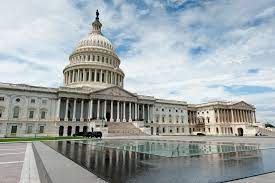By Julia Ciardullo
Fellow
With the 112th Congress now in session, Senators from both parties have already introduced legislation that would block EPA’s ability to regulate greenhouse gases (GHGs). This post addresses two of the most notable examples:
First, on January 31, 2011, Senator John Barrasso (R-WY) introduced the “Defending America’s Affordable Energy and Jobs Act.” The bill, which is co-sponsored by 10 other Republicans, would prohibit federal regulation of GHGs for the purpose of addressing climate change without explicit congressional authorization.
Specifically, the bill would prohibit EPA (or the President, or any other federal department or agency) from promulgating, issuing or enforcing any regulation, policy or guidance on GHGs, or from considering climate change when implementing federal laws. This would necessarily include the Clean Air Act (CAA), the Clean Water Act, the National Environmental Policy Act and the Endangered Species Act.
The bill would also invalidate a number of prior agency actions, including EPA’s “endangerment finding,” which states that GHG emissions from motor vehicles are reasonably likely to threaten the public health and welfare.[1] By invalidating the endangerment finding, the bill would legislatively overturn the Supreme Court’s decision in Massachusetts v. EPA, which requires EPA to regulate GHGs if it makes such a finding.
Other existing rules invalidated by the bill include the “timing rule,” which interprets the CAA to allow regulation of GHG emissions from stationary sources;[2] the “tailoring rule,” which requires certain large stationary sources of GHGs to comply with the Prevention of Significant Deterioration (PSD) and Title V permitting programs;[3] EPA’s rule requiring industry to monitor and report GHG emissions;[4] and a number of other rules promulgated by EPA to implement the PSD and Title V programs under the tailoring rule.[5]
The bill would also preclude legal action against sources of GHGs based on their contribution to climate change or any effect resulting from atmospheric concentrations of GHGs.
There are two exceptions to the sweeping provisions contained in the bill: (1) EPA and the Department of Transportation’s (DOT) emission standards and corporate average fuel economy (CAFE) standards for passenger cars, light-duty trucks, and medium-duty passenger vehicles for model years 2012 through 2016 would not be affected, although the bill would strip EPA of its power to manage those standards, shifting the responsibility entirely to DOT; and (2) regulation of GHGs would be allowed to the extent necessary to protect the public health from imminent and substantial harm caused by direct human exposure to the pollutants.
Of particular note, a press release issued by Senator Barrasso’s office states that the bill would not preempt states from enacting GHG emissions standards or other climate change legislation. However, the bill would invalidate any waiver granted under Section 209 of the CAA, which gives California the right to set motor vehicle emission standards that are more stringent than federal standards, or Section 177 of the CAA, which gives other states the right to adopt California’s standards in lieu of the federal standards. The bill would also revoke California’s right to set motor vehicle emission standards for model years 2017 and later. Because the CAA allows other states to adopt California’s standards, the bill effectively forecloses a vast swath of potential state action on climate even while falling short of outright “preemption.”
Further, the bill would invalidate any provision in a state implementation plan (SIP) that designates GHGs as a regulated pollutant or limits emissions of GHGs under state law.
Finally, the bill would prohibit any state from requiring an entity to procure, hold, or surrender allowances for the emission of GHGs taking place outside the state; regulating or taxing GHG emissions produced outside the state; or limiting the importation of products or electricity into the state based on GHG emissions occurring outside the state. This could interfere with regional market-based efforts to regulate GHGs, such as the Regional Greenhouse Gas Initiative (RGGI), and measures adopted by certain states (such as California) to require that electricity purchased from outside the state meet certain environmental standards.[6]
Second, the same day Senator Barrasso introduced his bill, Senator John Rockefeller (D-WV) re-introduced a bill to delay EPA regulation of GHGs from stationary sources for two years (S. 231). Senator Rockefeller sponsored a bill with the same name in the 111th Congress, but was unable to find enough support to ultimately get it passed. The Rockefeller bill is co-sponsored by six centrist Democrats.[7]
House Republicans have also introduced legislation that would hamper EPA’s ability to regulate GHGs, and additional legislation is expected in the next day or so.[8]
Although White House officials have continually indicated that President Obama would veto any bill that obstructs EPA’s ability to regulate GHG regulations, they have not specifically commented on the Barrasso or Rockefeller bills. However, one thing is certain: EPA will face increasing opposition to its GHG regulations in the next two years.
[1] Endangerment and Cause or Contribute Findings for Greenhouse Gases under Section 202(a) of the Clean Air Act, 74 Fed. Reg. 66,496 (Dec. 15, 2009).
[2] Reconsideration of Interpretation of Regulations That Determine Pollutants Covered by Clean Air Act Permitting Programs, 75 Fed. Reg. 17,004 (Apr. 2, 2010).
[3] Prevention of Significant Deterioration and Title VI Greenhouse Gas Tailoring Rule, 75 Fed. Reg. 31,514, (June 3, 2010).
[4] Mandatory Reporting of Greenhouse Gases, 74 Fed. Reg. 56260 (Oct. 30, 2009).
[5] For a complete list of affected regulations, see Section 4(a)(4)(B) of the bill.
[6] See, e.g., Cal. Pub. Res. Code § 25741(b), available at https://www.leginfo.ca.gov/cgi-bin/displaycode?section=prc&group=25001-26000&file=25740-25751.
[7] Senators Kent Conrad (D-ND), Tim Johnson (D-SD), Joe Manchin (D-WV), Claire McCaskill (D-MO), Ben Nelson (D-NE) and Jim Webb (D-VA).
[8] House Republicans seek to bar EPA from regulating greenhouse gases, https://www.chron.com/disp/story.mpl/nation/7408456.html (Feb. 1, 2011).


